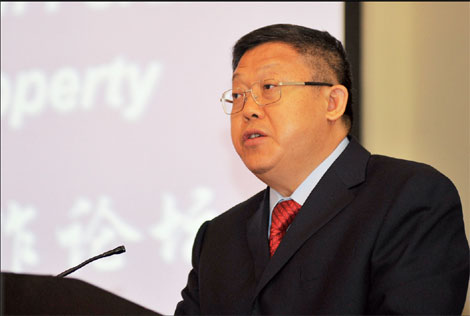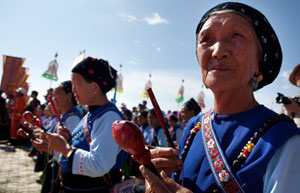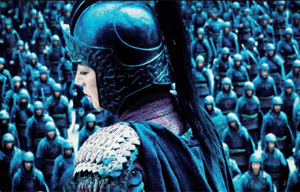China continues IPR dialogue with US
Updated: 2011-10-21 11:07
By Chang Jun and Stephanie Leung (China Daily)
|
|||||||||
|
Chong Quan, deputy China international trade representative, discusses IPR protection in China at the International Cooperation Forum on China's Intellectual Property, held on Oct 17 in San Francisco. Provided to China Daily |
SAN FRANCISCO - As it has been doing for the past 30 years, China will continue to work and communicate with the United States to protect intellectual property rights (IPR), government officials and trade representatives from both countries said at a forum in San Francisco on Monday.
The International Cooperation Forum on China's Intellectual Property, an important part of a series of IP events held outside China, and the run-up to the 22nd China-US Joint Commission on Commerce and Trade scheduled for November in Beijing, drew around 100 attendees.
In his welcoming remarks at the one-day forum, Assistant US Trade Representative Stan McCoy emphasized the important role IPR protection has been playing in moving and shaking the US-China relationship, bilateral trade in particular.
Statistics from China indicate that bilateral trade in the first three quarters of this year reached $325.9 billion, a 17 percent increase year-on-year. At the end of August, US investors injected a total of $66.95 billion into 60,568 projects in China, and China imported $90.3 billion worth of commodities and technologies from the US.
"IP has always been a key topic for trade relations between China and the US, and the two countries share common targets and interests on IP protection," said Chong Quan, deputy China international trade representative at China's Ministry of Commerce.
The two countries started IP-related exchanges in the 1980s, and strengthened bilateral communications in 2004 by establishing the IP working group of the China-US Joint Commission on Commerce and Trade, Chong said. Besides consensus and success between the two sides, Chong acknowledged that there "has been disagreement".
In an overview, Chong detailed what the Chinese government has been working on to protect IPR: Raising the public's awareness on copyright, trademarks and patent laws through various approaches, especially since China's entry into the World Trade Organization in 2001.
During the past 30 years, China has already put into place a complete legal system to protect IPRs, which is "consistent with China's national conditions and in line with international norms", said Chong. It also has an IP law enforcement system that "links and combines administrative enforcement and judicial protection", he said.
In 2008, IP was elevated to the status of national strategy in China, with the Chinese government making and executing detailed action plans every year, according to Chong.
From October 2010 to June, in an intensified effort to protect IPRs, "we have deployed (within our judicial system) special operations against IPR infringement and counterfeiting", said Huang Weiping, deputy director-general from the Supreme People's Procuratorate.
"IP protection has become an inherent demand for China's own development," Chong said. "The Chinese government has always valued IP and is firm in its attitude and determination," he added.
As a way to solve existing problems, Chong suggested the US needs to respect different levels of economic development, historical and cultural traditions and social resilience in order to establish a harmonious and balanced international IP system.
Chong attended the forum leading a large delegation of officials from the Ministry of Commerce, Supreme People's Procuratorate, State Administration for Industry and Commerce, General Administration of Quality Supervision, Inspection and Quarantine, National Copyright Administration, and State Intellectual Property Office.
The forum also featured an interaction panel where trade representatives from various industries shared their opinions. Greg Frazier, executive vice-president of the American Movie Association, expressed his concerns regarding IP protection in the movie industry specifically. He called for more in-depth exchanges between the two sides in order to better address this issue in the future.
China Daily










